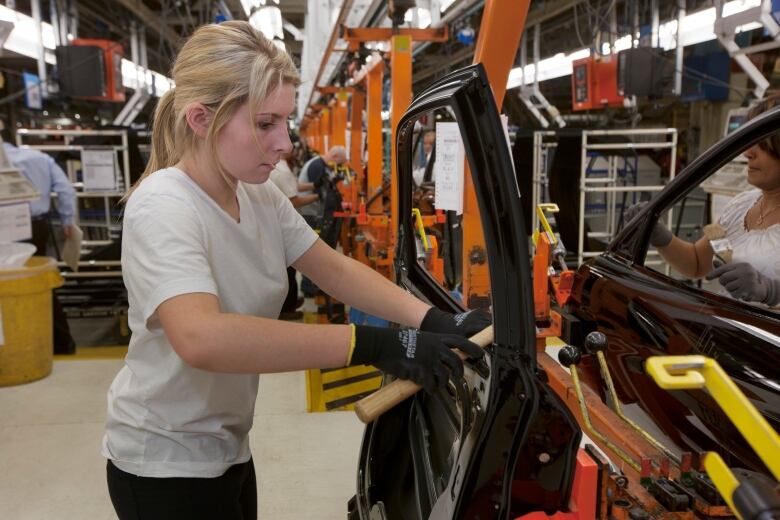Why southwestern Ontario's manufacturing rebound is missing in action
Canada's manufacturing heartland is trying to diversify itself to end a 'lost decade'
"The past is a foreign country: They do things differently there." L.P. Hartley
Southwestern Ontario's past is well known. The region was the industrial heartland of Canada. It was here they made everything from cars to ketchup.
For a long time, thismanufacturing model worked. It served people in the region remarkably well.
With the price of oil dramatically reducedand the Canadian dollar heading lower,there are real concerns about the state of Canadas economy. Many said manufacturing was one sector that would benefit from these changes. But for the most part, that growth hasnt emerged. The CBCs Peter Armstrong visited the manufacturing heartland of Canada in Southwestern Ontario to get a sense of whats going on.
But the model has been showing cracks for years now.
"It's been really tough time for the region," says economist Mike Moffatt. "We have some success stories, but over all it's been a bit of a lost decade."
- Robots expected to slash manufacturing costs in next 10 years
- Mexico passes Canada in car-making terms
Moffatt grew up in southwestern Ontario. He saw the landscape changing. And now much of his research at Western University's Ivey Business School is into how to get the region back on track.
He says it's just not realistic to think the future lies in the kind of large-scale manufacturing it's known in the past.
The current oil shock and plunge in the loonie serve as acase in point.
Oil drop
As the price of oil began to fall, many said manufacturing would benefit from a low dollar. The theory was that energy costs would be lower and the lower dollar would make the price of exports more attractive to foreign buyers.
But even as the dollar hit 78 cents, Canada's manufacturing industry continued to struggle. There have been somelimited signs of encouragement, but theyve been few and far between.

The fact is, many plants closed their doors in the wake of the 2008 financial crisis.
These factories have moved away. And the low dollar isn't as strong an attraction as some thought.
"We had a lot of companies in 1998-99 that really try to take advantage of the low dollar and got decimated when it went back up," says Moffatt. "Memories around here are really long, so people are not going to make that mistake again and start building new factories assuming that the currency's going to stay low."
Moffatt can rhyme off the many failings that have led us to this point. But he gets most exercised when talking about how to move forward.
More than three million people live in southwestern Ontario. That's about the size of Atlantic Canada. So, he says the Canadian economy can ill afford to let the area languish.
But moving forward means changing how businesses, governments, universities and entrepreneurs approach the region.
New economy
"People realize that the old models of the 1970s and '80s don't work," Moffattsays. "There is a recognition the new things need to happen, we just need to figure out what those things need to be."
Many here say that "new thing"is actually quite simple. That the future is not in large-scale factories, but rather in supporting dozens or hundreds of small businesses.

Businesses like Voices.comin London, Ont.
Ten years ago, David Cicarelli and his wife Stephanie were the sole employees occupying a small, London recording studio.
Today, the company has branched out to become an online agency of sorts for voice actors around the world. They have a roster of more than 120,000 actors and provide services to some of the biggest companies in the world.
And it seems that just about every week, theyre hiring a new employee in their London office.
Weve gone, really in the last couple of years, from 25, 50 and now 70 and itll be 71 starting next month, says Cicarelli.
New thinking
The question then becomes how tohelp local success stories build and continue to grow?
Part of the problem is convincing governments to change the way they invest in the region. And old habits are hard to break.
For generations, the job of governments was focused on attracting big companies to build big factories. For governments, that was easy, write a big cheque, create lots of jobs and move on. But as the dynamic changed, governments have struggled with what to do.
"They just dont know what to do. Theyre stuck in these old models of writing big cheques,"says Moffatt.
But progress is being made. Ciccarelli was approached by the London Economic Development Corp.about grants available from the federal government through its program called Federal Development Ontario.
We completed the application and just went through a long due diligence process mapping out a $3.6 million project over a number of years, and received $900,000 in reimbursable funds, says Ciccarelli. It was aloan for new hires and some new technology.
So, the process is changing. Many here look to the success of cities like Waterloo and Pittsburgh, where small start-ups are flourishing, and say, why not London or St. Thomas?
Manufacturing will likely always play a role in southwestern Ontario. But to see any serious level of jobs come back, economists and entrepreneurs say empowering small businesses to grow and prosper may be the best bet.













_(720p).jpg)


 OFFICIAL HD MUSIC VIDEO.jpg)
.jpg)



























































































